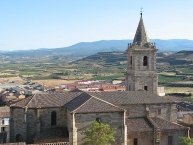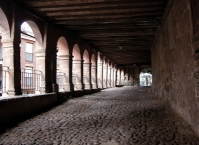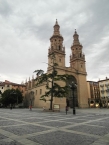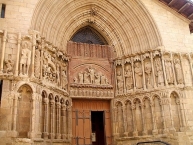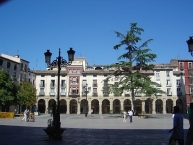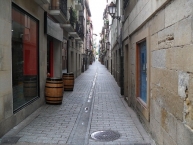Radtour Ebro auf dem GR99
Reisebericht
Aktionen
![]()
Bitte warten - Kartendaten werden geladen
Erstellt am 03.01.2022,
zuletzt geändert von TheDoc am 03.01.2022
Aktionen
Strecken-Merkmale
geplant
gefahren
Gesamtlänge in km
830
0
Gesamthöhenmeter Aufstieg
5.971
0
Durchschn. Steigung Aufstieg %
0,72
-
Gesamthöhenmeter Abstieg
6.861
0
Informationen zu Rechten an den GPS-Track-Daten | |
|---|---|
Rechte-Inhaber | |
Rechte-Ausprägung / Lizenz | by-sa: CREATIVE COMMONS Namensnennung, Weitergabe unter gleichen Bedingungen |
Link zur Rechtebeschreibung | |
gpx-Datei hochgeladen | durch TheDoc am 03.01.2022
|
Gesamtzahl Trackpoints
2.963
0
Trackpoint-Dichte per km
4
0
Endorte
Start
Fontibre, Cantabria, ES (893 m NHN)
Ziel
Deltebre, Catalonia, ES (2 m NHN)
Charakter
Informationen zu Urheber-Rechten | |
|---|---|
Rechte-Ausprägung / Lizenz | by-sa: CREATIVE COMMONS Namensnennung, Weitergabe unter gleichen Bedingungen |
Link zur Rechtebeschreibung | |
übernommen / bearbeitet am | 03.01.2022
|
übernommen / bearbeitet durch |
|
Landschaft
Informationen zu Urheber-Rechten | |
|---|---|
Rechte-Ausprägung / Lizenz | by-sa: CREATIVE COMMONS Namensnennung, Weitergabe unter gleichen Bedingungen |
Link zur Rechtebeschreibung | |
übernommen / bearbeitet am | 03.01.2022
|
übernommen / bearbeitet durch |
|
An- und Abreise
Flug nach Bilbao+Bus / Zug+Flug von Barcelona
Fahrradfreundliche Unterkünfte, Sehenswertes und Infrastruktur
Name u. Anschrift
Breite / Länge
Tel.
Fax.
Mobile
Art d. Unterkunft
Radler-freund-lichkeit
Strecken-km
km zur Strecke
Höhe
144 km
3,7 km
602 m
Öffnungszeiten
16 March till 31 October | 1 November till 15 March |
|---|---|
10:00-14:00 | 10:00-14:00 |
239 km
0,3 km
494 m
ES-01330 San Vicente de la Sonsierra
Touristen Information
271 km
4,4 km
517 m
Informationen zu Urheber-Rechten | |
|---|---|
Rechte-Inhaber | |
Rechte-Ausprägung / Lizenz | by-sa: CREATIVE COMMONS Namensnennung, Weitergabe unter gleichen Bedingungen |
Link zur Rechtebeschreibung | |
Bild übernommen aus | commons.wikimedia.org/wiki/File:Iglesia_de_la_Asunción_(Navarrete).jpg |
Bild hochgeladen | durch biroto-Redaktion am 14.03.2015
|
Informationen zu Urheber-Rechten | |
|---|---|
Rechte-Inhaber | |
Rechte-Ausprägung / Lizenz | by-sa: CREATIVE COMMONS Namensnennung, Weitergabe unter gleichen Bedingungen |
Link zur Rechtebeschreibung | |
Bild übernommen aus | commons.wikimedia.org/wiki/File:Iglesia_de_la_Asuncion-Navarrete-DSC07854.jpg |
Bild hochgeladen | durch biroto-Redaktion am 14.03.2015
|
Informationen zu Urheber-Rechten | |
|---|---|
Rechte-Inhaber | |
Rechte-Ausprägung / Lizenz | by-sa: CREATIVE COMMONS Namensnennung, Weitergabe unter gleichen Bedingungen |
Link zur Rechtebeschreibung | |
Bild übernommen aus | commons.wikimedia.org/wiki/File:Navarrete_-_Pórticos_1879723.jpg |
Bild hochgeladen | durch biroto-Redaktion am 14.03.2015
|
Navarrete ist ein Ort am Jakobsweg in der Autonomen Region La Rioja. Die Bevölkerung im Jahr 2021 betrug 2.996 Einwohner. Wegen seiner Baudenkmäler und seiner geschichtlichen Bedeutung wurde der Ortskern zum Conjunto histórico-artístico erklärt.
Hintergrund
Navarrete war verschiedentlich Schlachtfeld der Kriege zwischen Kastiliern und Navarresen. Die kastilischen Könige versuchten jeweils, ihre Grenzen gegenüber Navarra zu sichern und mit Burgen zu festigen. Aus diesem Grund schlug Alfons VIII. (Kastilien) den Einwohnern der umliegenden Weiler (San Llorente, San Antolín, San Pedro y Ntra. Sra.del Prado) vor, an einen befestigten Ort umzuziehen. Der neue Ort wurde dann um die Burg auf dem Tedeón-Hügel herum angelegt. Die Burg hatte eine weitere Befestigungsanlage, um die Bevölkerung im Verteidigungsfall aufzunehmen und zu schützen.
Der Ort erhielt ab 1192 weitreichende Fueros , die die Nutzung des Wassers der umliegenden Flüsse, Weiden, Wälder und das Recht auf Märkte und eine Messe einschlossen. Dank dieser Privilegien entwickelte sich Navarrete zu einem wichtigen Ort seiner Zeit.
Mit den umliegenden Dörfern bildete Navarrete eine „Villas del Campo“ genannte Mancomunidad. Dieser Gemeindeverband vereinigte seine Interessen bezüglich Ackerflächen, Weidewirtschaft und Holz und wurde seit dem 11. Jahrhundert erwähnt.
Der Ort ging durch eine Schenkung von Heinrich II. (Kastilien) an Juan Ramírez de Arellano über und gelangte 1380 in den Besitz von Diego Gómez Manrique de Lara, Herzog von Nájera.
Domenico Laffi erwähnt den Ort in seiner Reisebeschreibung Viaggio in Ponente a San Giacomo di Galitia e Finisterrae
Sehenswürdigkeiten
- Pfarrkirche ⊙Iglesia de la Asunción de María (Mariä Himmelfahrt). Der dreischiffige Bau wurde 1553 begonnen und im 17. Jahrhundert beendet. Im Inneren gibt es ein Barock-Retabel..
- Ruinen des mittelalterlichen ⊙Hospitals San Juan de Acre, gestiftet von Doña María Ramirez. Sie befinden sich linker Hand vor dem Ort, wenn man von Logroño
kommend dem Jakobsweg folgt. Sichtbar sind die Grundmauern, das Gebäude wurde im 19. Jahrhundert zerstört. Der Portikus von 1200 wurde am Friedhof als Haupteingang verbaut und ist dort (am Ortsausgang) heute zu besichtigen.
- ⊙Castillo. Der Gipfel des Tedeón-Hügels wird nach der einst dort befindlichen Burg genannt, von der keine Reste blieben. Heute befindet sich dort ein Aussichtspunkt.
Informationen zu Urheber-Rechten | |
|---|---|
Rechte-Ausprägung / Lizenz | by-sa: CREATIVE COMMONS Namensnennung, Weitergabe unter gleichen Bedingungen |
Link zur Rechtebeschreibung | |
Text(e) übernommen von: |
Seite „Navarrete (Rioja)“. In: Wikipedia, Die freie Enzyklopädie. Bearbeitungsstand: 4. Juni 2014, 20:53 UTC. URL: http://de.wikipedia.org/w/index.php?title=Navarrete_(Rioja)&oldid=131034376 |
übernommen / bearbeitet am | 14.03.2015 - 08.12.2022
|
übernommen / bearbeitet durch |
|
284 km
0,0 km
401 m
Öffnungszeiten
Winter (01 October-31 May)
Monday to Friday from 9 a.m. to 2 p.m. and 4 to 7 p.m.
Saturdays from 10 a.m. to 2 p.m. and 5 to 7 p.m.
Sundays from 10 a.m. to 2 p.m.
01 June to 30 June:
Monday to Friday from 9 a.m. to 2 p.m. and 4 to 7 p.m.
Saturdays and Sundays: 10 a.m. to 2 p.m. and 5 to 7 p.m.
Summer (01 July to 30 September)
Monday to Friday from 9 a.m. to 2 p.m. and 5 to 8 p.m.
Saturdays: 10 a.m. to 2 p.m. and 5 to 8 p.m.
Sundays: 10 a.m. to 2 p.m. and 5 to 7 p.m.
286 km
0,0 km
404 m
Informationen zu Urheber-Rechten | |
|---|---|
Rechte-Inhaber | |
Rechte-Ausprägung / Lizenz | by-sa: CREATIVE COMMONS Namensnennung, Weitergabe unter gleichen Bedingungen |
Link zur Rechtebeschreibung | |
Bild übernommen aus | https://commons.wikimedia.org/wiki/File:Logroño20130714223240SAM_2650Claridad2.jpg |
Bild hochgeladen | durch biroto-Redaktion am 01.01.2019
|
Informationen zu Urheber-Rechten | |
|---|---|
Rechte-Inhaber | |
Rechte-Ausprägung / Lizenz | by-sa: CREATIVE COMMONS Namensnennung, Weitergabe unter gleichen Bedingungen |
Link zur Rechtebeschreibung | |
Bild übernommen aus | https://commons.wikimedia.org/wiki/File:Logroño_-_Iglesia_de_San_Bartolome_01.jpg |
Bild hochgeladen | durch biroto-Redaktion am 01.01.2019
|
Informationen zu Urheber-Rechten | |
|---|---|
Rechte-Inhaber | |
Rechte-Ausprägung / Lizenz | by-sa: CREATIVE COMMONS Namensnennung, Weitergabe unter gleichen Bedingungen |
Link zur Rechtebeschreibung | |
Bild übernommen aus | https://commons.wikimedia.org/wiki/File:Plaza_del_Mercado_en_Logroño.jpg |
Bild hochgeladen | durch biroto-Redaktion am 01.01.2019
|
Informationen zu Urheber-Rechten | |
|---|---|
Rechte-Inhaber | |
Rechte-Ausprägung / Lizenz | by-sa: CREATIVE COMMONS Namensnennung, Weitergabe unter gleichen Bedingungen |
Link zur Rechtebeschreibung | |
Bild übernommen aus | |
Bild hochgeladen | durch biroto-Redaktion am 01.01.2019
|
Logroño is a city in northern Spain. It's the capital of the autonomous community of La Rioja, well known for its wine. Its population in 2021 was 150,808 inhabitants. The Way of St. James runs through the city as does the River Ebro.
Understand
The origin of Logroño is associated to the Roman Vareia, currently a neighbourhood of the city, and the Iron Age site on top of Monte Cantabria. Being an important crossroad on the Way of St. James and strategic point between the kingdoms of Aragon, Castile and Navarra helped to develop the city during the Middle Ages.
In 1095, the king Alfonso VI of León and Castile awarded the inhabitants of Logroño with the Code of Laws named Fuero. The king John II of Castile granted the status of 'city' in 1431 and the titles of 'very noble' and 'very loyal' in 1444.
In 1521, the population heroically resisted the siege of 30,000 troops sent by the king Francis I of France for 17 days. To remember the victory, Charles I ordered three fleurs-de-lis to be added to the city's emblem. A tribunal of the Spanish Inquisition was set in Logroño in 1570, being of historical importance in 1610 during the Basque witch trials.
The 1833 territorial division of Spain established Logroño as the capital of the new Province of Logroño, renamed in 1980 to Province of La Rioja and constituted as autonomous community since 1982.
Logroño is nowadays a city of 153 066 inhabitants and considered to have one of the greatest quality of life in Spain.
See
Churches
- ⊙Co-cathedral of Santa María de la Redonda (Concatedral de Santa María de la Redonda), C/Portales, 14, ☎ +34 941 257611. The cathedral was built during the 15th century and expanded in the 16th and 17th centuries. Behind the main altar there is a painting attributed to Michelangelo. Free entry.
- ⊙Church of San Bartolomé (Iglesia de San Bartolomé), Plaza de San Bartolomé, 2. It's the oldest church in Logroñed dated back to the 12th century. It has a magnificent arched cover which contains some Romanesque sculptures. Free entry.
- ⊙Church of Santa María de Palacio (Iglesia de Santa María de Palacio), C/Marqués de San Nicolás, 36. The church was built between the 12th and 13th centuries and has the Gothic octagonal spire as the most representative symbol. The second tower was built around 1560. Free entry.
- ⊙Church of Santiago el Real (Iglesia de Santiago el Real), C/Barriocepo, 6. M-Su 08:15–13:15 18:30–19:00. This is the site of the oldest church in the city, although the current building was constructed during the 16th century. Free entry.
Landmarks
- ⊙El Cubo del Revellín, C/Once de Junio, 6. W 10:00–13:00 Th F 10:00–13:00 17:00–20:00 Sa 11:00–14:00 17:00–20:00 Su 11:00–14:00. It's the best conserved part of the city wall and hosts an exhibition inside. Free entry.
Museums
- ⊙House of Sciences (Casa de las Ciencias), C/Ebro, 1, ☎ +34 941 245943. Tu–Su 11:00–14:00 17:00–20:30. It's located on the other side of the river Ebro in the former slaughterhouse. It hosts different scientific exhibitions over the year. In the garden, there are some tools you can use to do your own experiments. Free entry.
- ⊙Museum of La Rioja (Museo de La Rioja), C/San Agustín, 23. Tu–Sa 10:00–14:00 16:00–21:00 Su 10:00–14:00. The museum is housed in a Baroque palace of the 18th century and hosts different collections featuring paintings, sculptures and furniture. Free entry.
Wineries
In the old city you can visit some of the vaulted underground cellars known as calados. For a bigger understanding of the winemaking you can get a tour in one of the currently active wineries that surround the city:
- ⊙Bodegas Franco-Españolas, C/Cabo Noval, 2, ☎ +34 941 251290. M–F 11:30 16:30 Sa 11:00 13:00 18:00 Su 12:00. €9.
- ⊙Bodegas Viña Ijalba, Ctra. Pamplona, km. 1, ☎ +34 941 261100. M–Sa 11:00 12:00 17:00 18:00. €10.
Eat
You can't leave Logroño without visiting the famous ⊙Calle Laurel. that together with Travesía del Laurel, Calle San Agustin and Calle Albornoz concentrate more than 50 bars serving tapas, known in the north of Spain as pintxos.
Each bar cooks its own speciality, although new openings are specialized in more than one dish, always accompanied by a glass of Rioja wine. You can hop freely from one bar to the next one along the one hundred meters of the street that has an unbeatable atmosphere of good vibes. The circuit is popularly known as Trail of the Elephants, because people would walk on four legs if they visited all the bars.
In the neighbouring ⊙Calle San Juan. which is 300 meters far away, you can find another 30 bars that are usually less crowded and have different specialities.
Budget
- Prices of pintxos are around €2 so it can become expensive if you feel really hungry or can't stop trying all those delicacies. An option to keep the budget low would be ordering bigger portions of them that are called raciones and are usually served in clay pots. Some of these bars serve as well bigger sandwiches known as bocadillos or bocatas.
- In autumn and winter you can find churrería stalls selling a fried-dough pastry named churro. During the cold months is common to find as well smaller kiosks selling roasted chestnuts.
Mid-range
During working days most of the restaurants offer a daily menu for lunch which includes three courses, bread, wine and water ranging from €10 to €15.
- ⊙Boragos, Plaza del Mercado, 2, ☎ +34 941 250353. Tu–Su 13:30–16:00 21:00–23:00. Modern cuisine with cod as speciality. Daily menu €20.
- ⊙LaMaite, C/Sagasta, 6, ☎ +34 941 254747. Traditional food with a special touch. Daily menu €14.90.
Splurge
- ⊙Tondeluna, C/Muro de la Mata, 9, ☎ +34 941 236425. M–Sa 12:00–16:00 20:30–23:15 Su 11:30–16:30. The 2-Michelin starred chef Francis Paniego opened this restaurant in 2011. It has affordable prices for cuisine of high quality elaborated with local products. Daily menu for €19 and 6-courses tasting menu at €40.
Informationen zu Urheber-Rechten | |
|---|---|
Rechte-Ausprägung / Lizenz | by-sa: CREATIVE COMMONS Namensnennung, Weitergabe unter gleichen Bedingungen |
Link zur Rechtebeschreibung | |
Text(e) übernommen von: |
Wikivoyage contributors, 'Logroño', Wikivoyage, The FREE worldwide travel guide that anyone can edit, 3 July 2018, 23:16 UTC, https://en.wikivoyage.org/w/index.php?title=Logro%C3%B1o&oldid=3546284 |
übernommen / bearbeitet am | 01.01.2019 - 08.12.2022
|
übernommen / bearbeitet durch |
|
![]()

